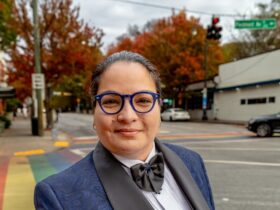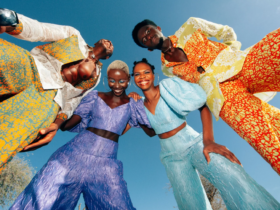A crisis can be defined as a time of intense difficulty, danger, or instability that poses a threat to the well-being, security, or normal functioning of individuals, organizations, communities, or societies. The maternal health for Black women fits this description to a tee. With mortality rates at an all-time high in the United States, it’s imperative that society takes a deeper look at equitable access to comprehensive prenatal care along with actually acknowledging racial bias as a whole within healthcare systems.
“It’s important that we realize that as we are going through the motions, and we’re living our lives, despite our pain and our loss, we can’t stop fighting,” states Toshira Maldonado, M.Ed. a Community Birthworker, Doula and Birthing Advocate.
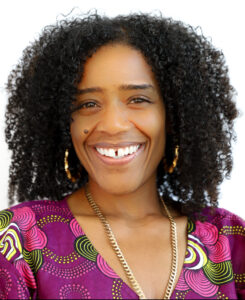
Throughout Toshira’s work as a doula and lay-midwife, she makes it her life’s mission to educate and inform pregnant women everywhere of their right to a healthy and positive birthing experience while urging the need for change. A mainstream doula is a birthing companion that supports the comfort of the pregnant person and helps to create a positive pregnancy, birth, or postpartum experience. A community doula is a culturally aligned measure of support for a pregnant person. They not only serve as a birth companion and support comfort but they are a source of emotional, physical, and educational support to help mothers advocate for themselves and understand their rights.
Toshira also introduces the role of a community doula, a life-saving measure that is meant to be an educational link to maternal care with women giving birth. “Community doulas offer birthing people the ability to understand, as well as advocate, for their maternal health care,” explains Toshira. This includes helping them understand their choices while offering support at a time when they are most vulnerable.”
While bringing life into the world should be a time of elated joy, the pregnancy experience can often be riddled with fear for Black women due to rising mortality rates. Toshira highlights that America has some of the worst birthing outcomes in comparison to other developing countries, largely due to the systemic racism faced within this country.
“I think it’s important to highlight that there has always been a Black maternal mortality crisis in America,” reveals Toshira. “When we put it in perspective, in terms of how long this crisis has existed, and how long we’ve suffered over our ability to have agency and power over our bodies and reproductive justice, whereas our white counterparts have reproductive rights that they simply get to stand up for. They don’t necessarily have to fight for their rights.”
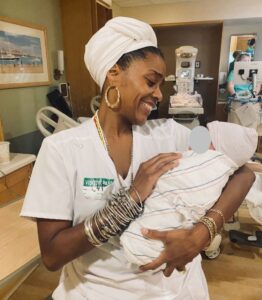
According to Toshira, systems that manage poverty also control the access to resources and information related to services that support optimal birth outcomes for BIPOC women and birthing people. Having access to Community Doulas and Maternal Health Advocates can support community education which can move the needle in a positive direction of better maternal health outcomes.
“Black Women with education and wealth have agency and power over their bodies that still gets disregarded. Even with access to resources and the ability to access top tier healthcare, they still do not get the optimal birth experience. They still face obstetrical racism and violence. It’s a human rights violation,” admits Toshira.
Another major issue is the lack of education between healthcare professionals and patients. Most patients simply don’t know what their rights are as well as what an optimal birth experience entails, which develops a disparity on how they need to advocate for themselves. Toshira believes that poor outcomes related to Black birth are also a part of the capitalist landscape and economic structure of healthcare systems that has disproportionate negative affects on Black mothers and babies. These systems, rooted in white supremacy will continue to profit off of black birthing traumas. This begs the question: how do we move forward?
“It starts with ensuring the person who is pregnant understands that it is their responsibility to focus on their health when they become pregnant,” says Toshira. “Because of the historical antecedents of trauma, our DNA may predispose us to some things that could have an effect on our prenatal health. We have to first get the whole picture to remain in control of our bodies.”
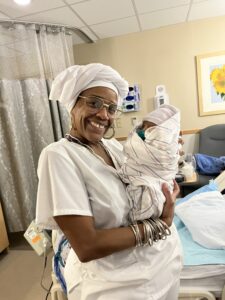
One key piece of advice that Toshira gives to expectant mothers is to be the expert in the room when meeting with healthcare providers. The more we understand our family history, the more we are able to communicate to providers what conditions are caused by pregnancy and what could be pre-existing conditions that could change the outcome of the pregnancy.
While there are still many disparities for Black pregnant women, Toshira acknowledges that there is growing momentum in the birth justice movement, a necessary step for overall change. By raising awareness for equitable treatment of BIPOC women we can continue addressing the importance of empowering pregnant individuals to take charge of their health and advocate for their rights.
“It’s important that the fight continues, because our future depends on it,” emphasizes Toshira. “If Black birth continues to happen, then it needs to happen powerfully.”
To stay connected to Toshira Maldonado:
- Instagram: @beautiful_womb



